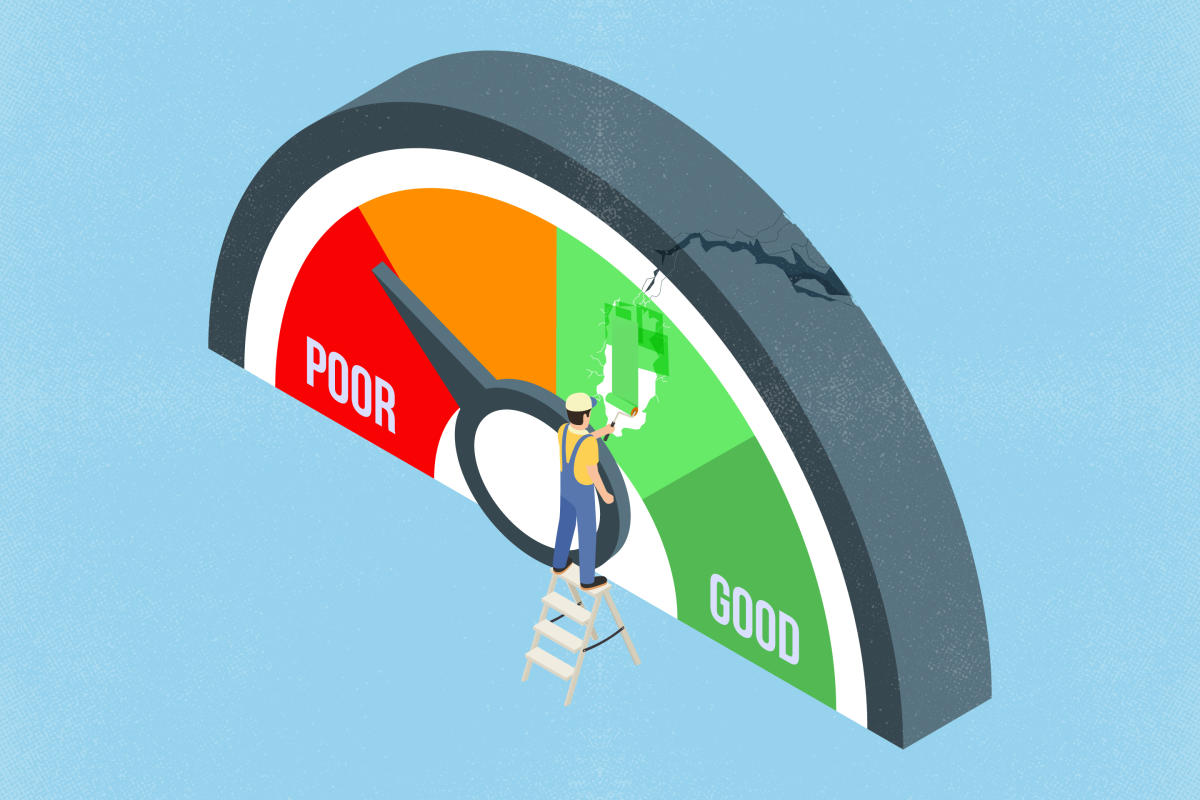Personal Finance
How to Repair Bad Credit

Repairing bad credit is possible but time-consuming. It’s also a minefield. You need to know what steps to take, where to find help and which companies to avoid. The stakes are high, and the consequences could haunt you for years.
Your credit report, history and score all wield a huge amount of power over your finances. They affect not only whether you get approved by lenders for things like a mortgage, personal loan or car loan, but also the specific terms of the agreement, like how favorable your interest rate is going to be.
If you want to learn about the various tools, methods and habits that can help you improve a poor credit score, read on.
10 tips for repairing bad credit
1. Check for errors on your credit report
The first, most basic step is to download a copy of your credit report. Lamine Zarrad, founder and CEO of StellarFi, a public benefit corporation focused on credit-building, says this is not only important so you can get a sense for where you are in your credit journey — it also gives you a chance to look for fraud or other inaccurate negative items.
“With some folks who have bad credit or adverse marks on the credit report, it may not be their fault — it could be an error,” Zarrad says. According to the Consumer Financial Protection Bureau, common credit report mistakes include closed credit accounts showing as open, debts that appear multiple times and incorrect balances.
You can get a free credit report from all three major credit bureaus — Experian, Equifax and TransUnion — by visiting annualcreditreport.com. This won’t give you a score, but it will show you negative information and areas that may need improvement. (FYI: You can pull online credit reports from each of the bureaus once a week through the end of this year.)
If you spot any incorrect information on your credit report, you can dispute it by writing a letter to the appropriate credit reporting agency. The Federal Trade Commission has an example credit disputing letter you can look at if you’re unsure how to do this. You’ll need to be able to explain what’s wrong and provide proof.
“Dispute those transactions,” Zarrad says. “If you didn’t do it — or someone else did it to you, and there’s a mistake — the fastest way to fix it is to go to the bureaus.”
2. Look into statutes of limitations
Look over your credit report for any bills you’ve overlooked or accounts you might have forgotten about. Verify that the statutes of limitations on your debts haven’t run out — if enough time has passed, it might prohibit collection agencies from suing you. (Check with an attorney to confirm, though.)
3. Rethink your credit utilization ratio strategy
Credit scores take into account a number of different factors. One of them is your credit utilization ratio, which measures how much credit you’re using in relation to the overall credit limit you have at any given time.
Ideally, this ratio should never go over one-third or roughly 30% of your spending limit. For example, if you have a total of $1,000 of available credit, you generally don’t want to use more than $300.
“It’s a good sign to a lender that you’re disciplined enough, you’re not utilizing all of it, and if you were to fall on hard times, you have something to fall back on,” Zarrad says.
But remember: That 30% threshold is a maximum. When it comes to your credit utilization ratio, he adds, “the lower the better.”
4. Make a plan to pay all your bills on time
Payment history makes up 35% of your credit score, so it’s crucial to address late payments and make plans for the future. You should also prioritize paying off any credit card accounts in collection.
Think about ways you can find cash: Can you adjust your spending habits? Are there expenses you can cut to free up money to put towards your bills? Do you have unneeded subscriptions you can cancel so you can redirect those funds?
“Payment history is so impactful on a credit score. Late payments on your credit bills [are] about the worst thing you can do to yourself,” Zarrad says.
If you need help creating a repayment strategy, reach out to a certified financial planner or a credit counselor. Nonprofit organizations like the Association for Financial Counseling and Planning Education and the National Foundation for Credit Counseling can connect you with one.
5. Become an authorized user on someone’s credit card
An authorized user is someone added to an existing credit card account under someone else’s name.
Authorized users can use the card as if it was their own, but they’re not responsible for any credit card debt they rack up. And since they’re sharing the card’s payment history and utilization rate, this can increase their credit score over time.
The financial risks here are mostly for the cardholder, not the authorized user. But as someone trying to build credit, you may have to ask some awkward questions before sealing the deal, like inquiring about the person’s payment habits to determine whether this is the right move for you.
6. Use a program to boost your credit score
Some programs can raise your FICO score — the most widely used type of credit score — by expanding your credit file. They do this by including alternative data as part of your credit report. This is data not typically found on traditional credit scoring models.
Experian Boost, for instance, can enhance your credit file by reporting any payments made to subscription services, including Hulu and Netflix. It also can report your phone, utility and rent payments (more on that below). Experian Boost is free and targets your FICO Score 8.
Another option is UltraFICO, a free scoring model that assesses how “risky” you are as a borrower by looking at your checking, savings or money market accounts. You then get an UltraFICO Score you can take to potential lenders and show them your account history, the frequency of your bank transactions, what your balances look like and how much cash you have in the bank.
There’s also Zarrad’s StellarFi, which functions like a line of credit without relying on alternative data. You link your bank account, add your bills and let StellarFi automatically pay them on your behalf. Then it reports this history of on-time monthly payments to the three big bureaus (as well as a fourth, Innovis), helping you build a positive history. StellarFi fees start at $4.99 a month.
7. Use a rent reporting service
If you’ve been paying your rent religiously, you can use it to your advantage. Some landlords, particularly those who manage multiple properties, use digital platforms to keep track of their tenants’ payments — and also report them to the credit bureaus.
This can help your credit because it establishes that you’re a person who — say it with us — has a history of paying their bills on time. Ask your landlord or property management company if they’re signed up with (or willing to sign up with) a service like Esusu.
If your landlord doesn’t use a rent-tracking platform, you can always subscribe to a rent reporting service like Rental Kharma or CreditMyRent. These services post your positive rental payments to your report for a monthly fee. There are also free alternatives like Piñata, which reports on-time payments to TransUnion only.
8. Consider debt consolidation
Debt consolidation consists of bundling all your debts into one loan. This often leads to a lower interest rate or a lower monthly payment when compared to individual bills. This repayment strategy can be beneficial for those who have trouble juggling multiple due dates or have various high-interest credit card balances.
9. Avoid bad habits
Try to avoid applying for many new credit cards or closing several old accounts without a larger financial strategy. With credit, everything is connected, so closing old and opening new accounts rapidly could hurt your history and credit mix.
For example, applying for several new credit cards — say, a bunch of retail cards at various stores — in a short period of time could result in repeated hard inquiries, which can decrease your credit score. You may want to consider getting a secured credit card, backed by a security deposit you pay upfront, instead.
10. Be patient
Rebuilding bad credit isn’t a fast process. Negative marks or delinquencies, such as missed payments, can stay on your credit report for up to seven years, while some types of bankruptcies can stay on your report for up to a decade.
It may take a few months — or even years — for a person to raise their credit, but it is feasible with some elbow grease. Avoid making rash decisions that could lead to crucial mistakes.
Credit builders will have an impact, but even they aren’t “a long-term solution,” Zarrad says, adding: “You’re not suddenly going to have an improved score if you have bankruptcy or a history of missed payments or late payments.” Repairing your credit often requires changing your financial habits.
Do credit repair companies work?
Though you can repair your credit yourself for free, it can be a tedious process, especially if you’re unsure what you’re looking for. That’s when hiring a credit repair company can come in handy.
“Any person can repair their own credit,” says Howard Dvorkin, chairman at Debt.com. “We also pay people to change our oil, but any person can do their own oil change — you have to have some knowledge and do some prep work. It’s the same thing.”
If you choose to utilize credit repair services, make sure the provider is legitimate, as the credit repair business is an area rife with scams.
Bad actors prey on distressed borrowers who are desperate for a quick fix, often “falsely claiming” they can remove negative info from your credit report, according to the FTC. The commission reports that there have been hundreds of lawsuits “against these bogus credit-related services.”
Here are some tips.
Review your rights
Credit repair companies have to follow the Credit Repair Organizations Act, which forbids them from lying to you or charging you in advance.
Before the company takes action, you’ll have to sign a contract that fully lays out the payments you’ll have to make, the services it will provide and the timeline it’s going to follow. And, most importantly, if you change your mind, you’re allowed to cancel your contract within three days.
Know what credit repair companies can and can’t do
As detailed above, building and improving credit takes time. Any company that makes overblown claims, like guaranteeing to fix your credit without first evaluating your case, is probably a scam. Ditto any service that offers to create a “new credit identity” for you or vows to remove negative, but accurate, information from your credit report.
In general, you can’t take anything that is true and timely off your report. Disputed items may be temporarily removed from your report while they’re being investigated, but if they’re ultimately found to be legit, they’ll come back.
Check the company’s reputation
Research the credit repair company’s track record by looking it up on consumer review websites like the Better Business Bureau.
Another tip, according to the CFPB, is to ask yourself questions like “is the company being upfront and forthcoming about their services and fees?” and “what specific services will be provided?” as you’re vetting the companies.
Remember: There is no magic fix to repairing bad credit. If you need help, consider finding a reputable credit counseling agency. Many will provide you with actionable advice from trained experts for free.
How to repair bad credit FAQs
What is a bad credit score?
Credit scores typically range between 300 and 850. According to Equifax, anything below 580 is considered a “poor” credit score. If you’re looking to have good credit, you’ll need to have a score upwards of 670.
How to fix bad credit?
To fix bad credit, you need to assess the factors that are dragging down your score.
If your main issue is that you have a short credit history, you can boost your credit score using a rent reporting service, a program that reports utility payments or a secured credit card. But if you have negative marks on your report or a high credit utilization ratio, then your best bet is to come up with a smarter repayment strategy.
How long do negative items stay on your credit report?
Late or missed payments and Chapter 13 bankruptcies can stay on your credit report for seven years. Chapter 7 bankruptcies can stay on your credit report for up to 10 years.
Summary for how to repair bad credit
Fixing your credit can be a lengthy process, but in the end, it is worth it given all the different areas of your life impacted by your score. Credit monitoring, on-time monthly payments and healthy financial habits are key to having better credit. Be patient and stick to a strategy that’s been proven to succeed.
Heidi Rivera contributed to this story when it was originally published in 2021. This is a new version of the story with updated information.
© Copyright 2023 Money Group, LLC. All Rights Reserved.
This article originally appeared on Money.com and may contain affiliate links for which Money receives compensation. Opinions expressed in this article are the author’s alone, not those of a third-party entity, and have not been reviewed, approved, or otherwise endorsed. Offers may be subject to change without notice. For more information, read Money’s full disclaimer.
Read the full article here

-

 Side Hustles6 days ago
Side Hustles6 days agoHow Charlotte’s Rally Pickleball Got Its Start
-

 Make Money6 days ago
Make Money6 days ago5 Surprising Ways Trump’s Trade Agenda Could Affect What You Pay at Checkout
-

 Investing6 days ago
Investing6 days agoQuantum stock soars on new file system client By Investing.com
-

 Side Hustles4 days ago
Side Hustles4 days agoKickstart Your Year With These Entrepreneurial Health Checkups
-

 Side Hustles3 days ago
Side Hustles3 days agoExpand Your Global Reach with Access to More Than 150 Languages for Life
-

 Side Hustles2 days ago
Side Hustles2 days agoKFC Announces Saucy, a Chicken Tenders-Focused Spinoff
-

 Investing2 days ago
Investing2 days agoPalantir, Anduril join forces with tech groups to bid for Pentagon contracts, FT reports By Reuters
-

 Side Hustles3 days ago
Side Hustles3 days agoThis AI is the Key to Unlocking Explosive Sales Growth in 2025


















